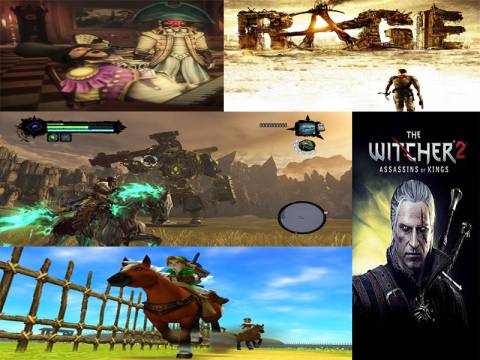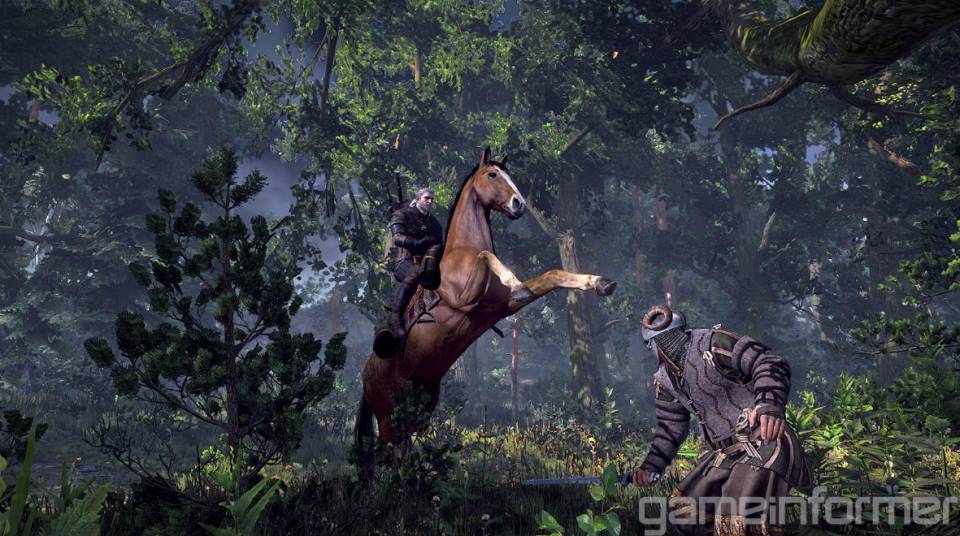Let's talk about the archipelago effect in open world games.
By granderojo 12 Comments

On the most recent bombcast there was a discussion about open world games, and it as usual the crew summated the problem with some of the games of this genre quite well. I thought I would expand their conversation here about a specific subsection of open world games that I've been playing recently that I have a problem with. So I've been playing Darksiders II, about 5 hours in and I can confirm that yes it indeed does adhere unflinchingly from the structure first popularized by the The Legend of Zelda: Ocarina of Time. This approach to open world game design reminds me of a scene from one of my favourite films, Ninotchka. In this approach to open world, the world is split into what I like to call them archipelagos. In that the core content and are infact just linear experience split between a barren of the world which does nothing but waste the players time, which resembles archipelagos.
Game designers and even some critics will argue that these areas of uninspired content exist to provide adequate pacing but I want to offer a counter thesis. The archipelago effect in some open worlds exists to offer the player a negative experience on purpose. Game designers think the absence itself in these barren areas between the involved content offers a clear counterexample and will uplift the content they actually put more work into as a result. This genius is on display in many games, there's no other way to describe it other than irritating and we all have Nintendo to thank for this trend.
The most egregious modern example of this stupidity would have to be Rage, which took this concept to it's illogical extreme and produced the endlessly disappointing and fleeting experience which all fans of ID Software lament to this day. I would argue not only does it exist to split the compelling content from the drear but to trick the player into thinking he's exploring in a meaningful way when infact he isn't. The exploration of the open world is not meaningful exploration but in fact just a stringed network linear experiences where the game obstructs the player from the worthwhile content to extend the length of the play experience.
The "open world" or barren wastes as I like to call them in these games are full of enemies which pose no threat, and usually result in the player moving through them as efficiently as possible to get to the more interesting content. There's no sauntering in this world like there is in an exploration game like Proteus to absorb the the world, but instead a brutal efficiency where the player tries moving through the area as quickly as possible. This hiking as I will call it instead of sauntering manifests itself in the 'open world' in the form of the cooldown of carrots on the horse for the 3d Zeldas or Darksiders 2 or in the boosts in Rage. When presented the archipelagos of content the player will rush from one island of compelling content to the next, and the designer gave no reason for why it should exist in an open world context.
This structure has existed so long at this point and that there are even varying stages of evolution of it's stupidity. A sterling example of this would be the Fable series. The network of linear experiences broken up by uninspired content is most egregious when you realize that the ingame maps never quite line up with the in game world itself. They are in fact useless because there is infact little to no incentive for the player to actually explore. Fable approach to open world is the equivalent of the player saying to the Molyneux "Can you make a game with a compelling world that is without the parts that bore me to death?" and the Molyneux respond, "I'm sorry player I can't make boring games, can the game be without direction?" This is not only Molyneaux's fault, even acclaimed games like Journey were developed on the premise that players need the absence itself of compelling content manifested in the game to convey a targeted experience to the player.
This approach to game design says more about players themselves than the designers, and more to the point that inane design has proliferated as long as it has due to these games being commercially successful but there is hope. A game that I enjoyed quite a bit but felt was horribly held back by the archipelago approach was The Witcher 2 and on the cusp of Skyrim selling around fifteen million copies, it seems some developers have finally a commercial reason to give players a reason to explore their worlds. The Witcher 2 will feature an actual open world, and no longer will it follow similar conventions of Fable of a lack of direction within the world. After playing through Dead Space 2, I'm convinced that the archipelago could have existed in that game and it would have been worse for it. Going forward, developers need to make up their mind. If they're going to have an open world make it like Skyrim or Proteus where there are actual reasons to absorb the world or offer a directed experience like in Dead Space 2 or Half Life.

What do you think? @Granderojo
